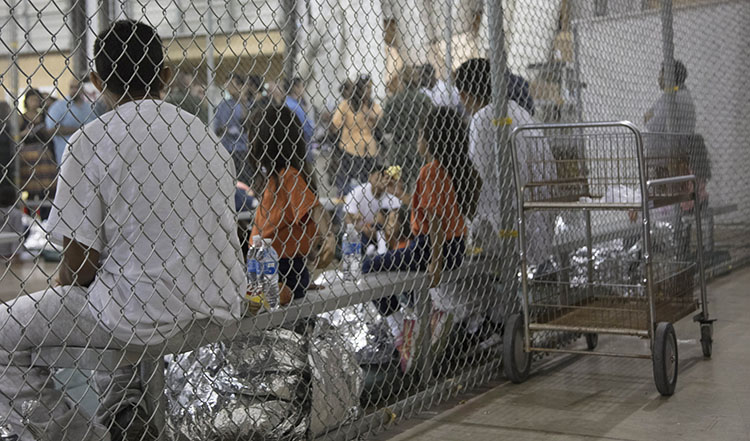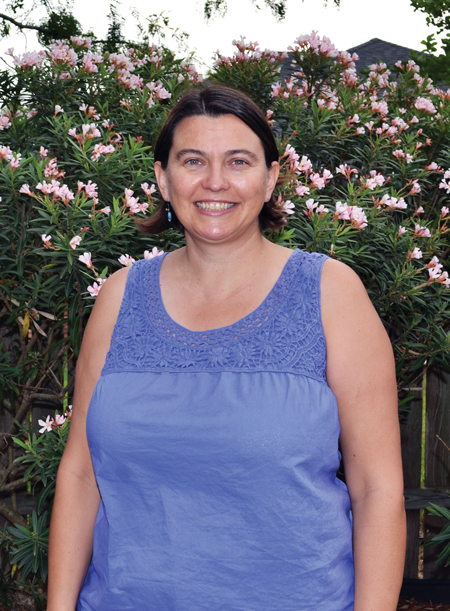ABA asylum project attorney describes representing separated families at the border

Immigrants are detained June 17 at the Border Patrol’s central processing center in McAllen, Texas. U.S. Customs and Border Protection.
Attorneys representing asylum-seekers from Central America frequently have worked with traumatized clients. But since the federal government began separating families after arresting parents for illegal entry, Kimi Jackson of the ABA’s South Texas Pro Bono Asylum Representation Project says the trauma has gotten far worse.
“We’ve served these two populations for years, but never have we seen anything like what’s going on now with these family separations,” Jackson, the director of ProBAR, tells the ABA Journal. “The children who are separated from their parents obviously are very traumatized. And [the parents are] in acute distress because they don’t know where their children are.”
ProBAR is based in the Rio Grande Valley of Texas, where the Mexican border, U.S. Customs and Border Protection stations and multiple immigrant detention centers are located. The project connects volunteer attorneys with both adult and child clients seeking asylum. Central America is a region wracked by violence, as the Council on Foreign Relations explained in January.
See also: Trump signs an executive order to end family separations; ABA applauds ‘first step’
As Jackson describes it, recent federal policy changes have made every step of the asylum-seeking process more difficult. That starts at the border, where, under U.S. and international law, foreign nationals are supposed to be able to present themselves to a CBP agent to request asylum. But Jackson says CBP has been turning them back.
“They started stationing an officer at the middle of the bridge, right on the international border, just on the U.S. side, and not allowing the asylum seekers to set foot in the United States at all,” says Jackson. “People are flat-out being denied access to the legal way to request asylum. Denying people the right to request asylum is not permitted by law. So instead, the only way to come is without inspection [illegally].”

Kimi Jackson
En masse hearings
Those caught entering outside of an official crossing are arrested and taken to CBP stations for processing. This is where parents and children are separated, she says. Minors may be kept up to 72 hours before being turned over to the Office of Refugee Resettlement, part of the U.S. Department of Health and Human Services. Adults generally spend about two days at the CBP station before they are taken—still in the street clothes they crossed in, and shackled at the waist and wrists—to federal court.
There, the adults are asked to plead to unlawful entry—a misdemeanor on first offense, which it is in most cases. These are hearings en masse, Jackson says—up to 100 people at a time may enter pleas on the busiest days. Because there are so many, they are asked to stand or sit to indicate answers to questions.
Marjorie Meyers, the federal public defender for the Southern District of Texas, says the mass hearings predate the Justice Department’s “zero tolerance” policy that is separating families. Her attorneys explain the basics to the entire group and meet with each defendant individually. But because the facts are usually not in dispute, it generally doesn’t make sense to fight the charges, and most people plead guilty.
“So does it violate due process? Arguably,” she says. “Is the result any different if it was individualized? I don’t think so, because they’re getting time served.”
The San Francisco-based 9th U.S. Circuit Court of Appeals has ruled that these mass hearings violate due process, Meyers notes, but the New Orleans-based 5th Circuit, which includes South Texas, has not weighed in. Some of her colleagues in the Western District of Texas have argued that taking the children has a coercive effect that violates their clients’ due process rights, but that claim was rejected by a magistrate and a judge, according to the Houston Chronicle.
The sentence after these pleas is generally time served—the two days or so defendants spent in CBP custody—and they’re sent directly to immigration detention centers. There, they’re put into “expedited removal”—deportation without a court hearing—unless they pass an interview that permits them to claim asylum. This means they don’t appear on immigration court dockets, which means ProBAR is not able to provide them with services unless they happen to call.
“Many will be deported without ever seeing any attorney,” Jackson says.
Representing underage clients
Meanwhile, the children stay in HHS custody unless they can find an adult sponsor in the United States—a relative or family friend who has been evaluated by the government. Younger children may not know how to reach any such person, Jackson says, and the federal government has no provision for families to communicate or reunite while in detention.
This makes proving their asylum cases difficult, Jackson says. She says the separated children are more likely to be under age 12 than truly unaccompanied minors. They may not know all the facts of their cases because parents have shielded them, she says. That’s in addition to the difficulties created by their age and any trauma they’ve experienced—from the conditions in their home countries, the difficult journey or the policy of family separation.
Jackson is skeptical of federal officials’ claims that family separation is a deterrent to further immigration. She works directly with asylum seekers from Honduras, El Salvador and Guatemala, where criminal street gangs are in control and are ignored or even assisted by police. If you’re the mother of a 12-year-old girl that a gang member has claimed as his “girlfriend,” she says, even the prospect of being incarcerated for seeking asylum may be better than the alternatives.
“Your daughter can either say yes, in which case she’s going to get involved with gangs. Or she can say no, in which case she’ll be gang-raped and killed,” says Jackson. “Nothing is going to deter you from leaving and protecting your child.”
Attorneys interested in helping represent the separated minors or their parents can volunteer through ProBAR, either in South Texas or in their home cities, or donate through the ABA’s Fund for Justice and Education. ProBAR is also adding South Texas staff positions to meet the new demand, and is actively seeking applications from immigration lawyers fluent in Spanish.
See also:
ABA Journal: “Along the Texas-Mexico border, immigration lawyer Kimi Jackson deals with life and death”
ABAJournal.com: “Immigrants illegally entering the country experience ‘rapid-fire justice’ in federal courts”
ABAJournal.com: “Want to stop separation of immigrant families? ABA plans grassroots effort, while new group forms”
ABAJournal.com: “Separating families violates civil rights, won’t work and is inhumane, ABA president says”
ABAJournal.com: “Trump signs an executive order to end family separations; will it spur lawsuits?”
Updated on June 28 to fix a typo.



